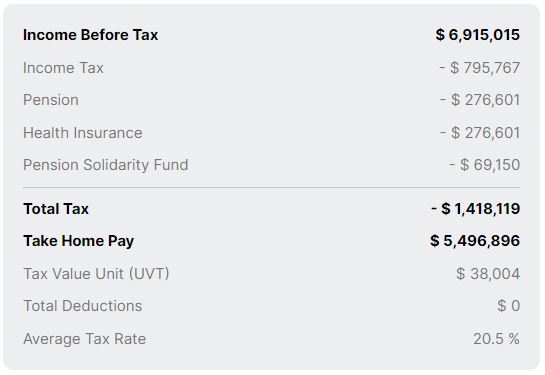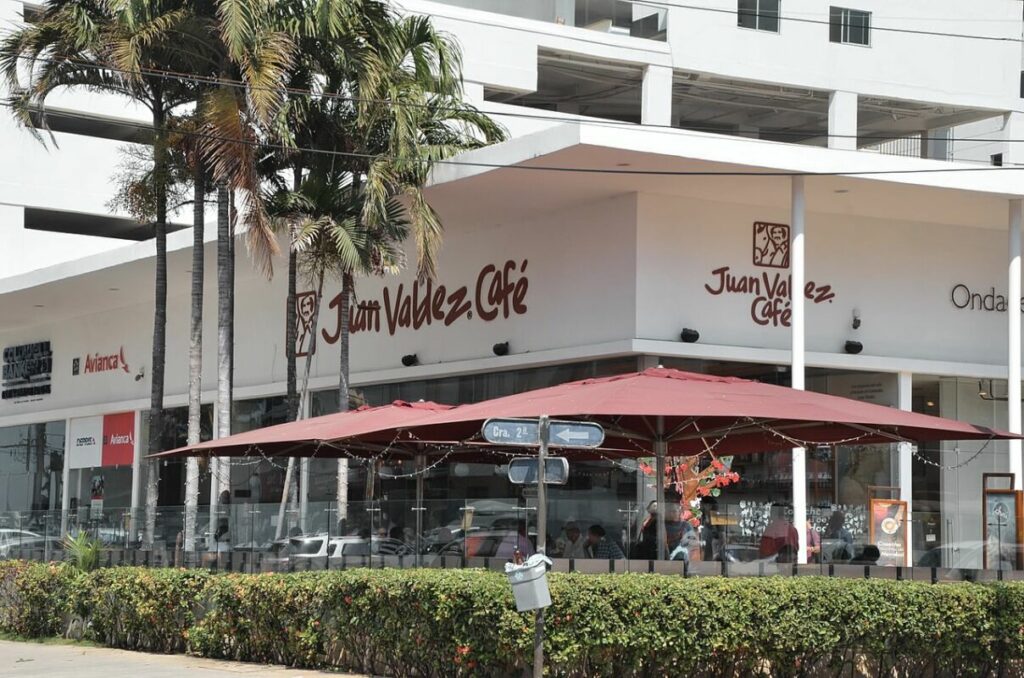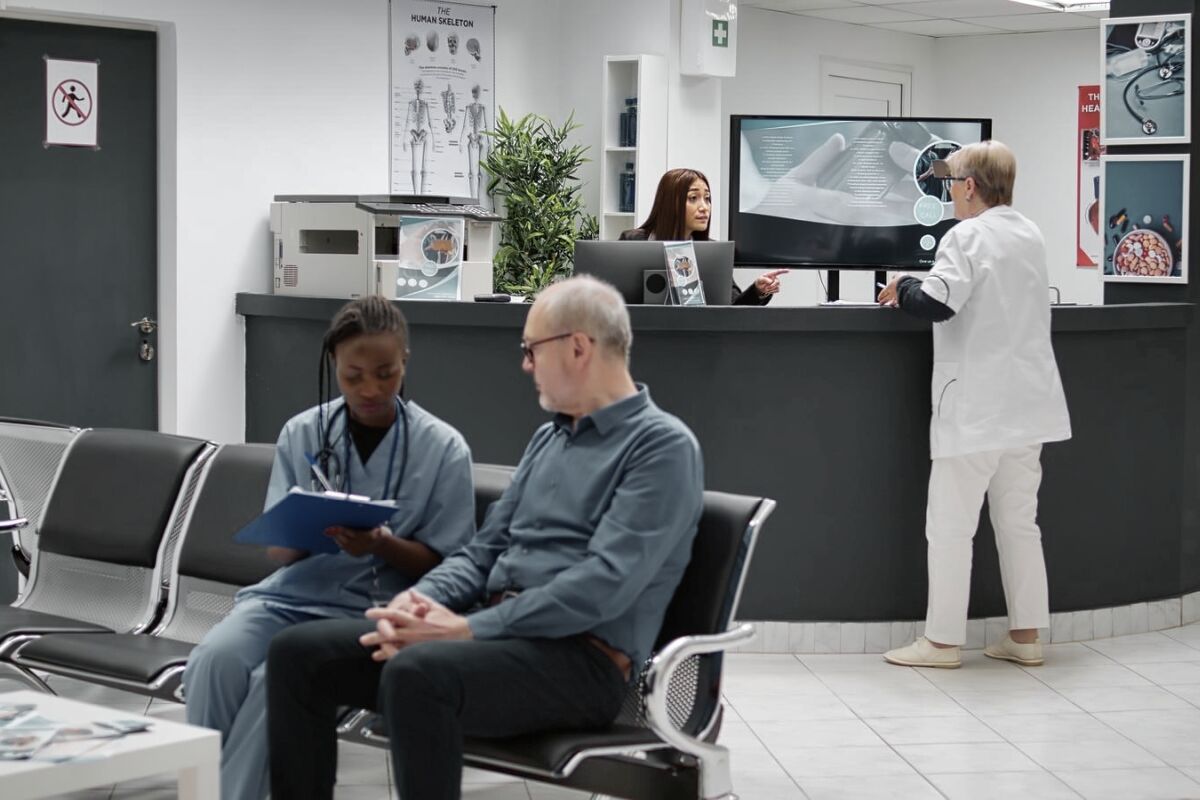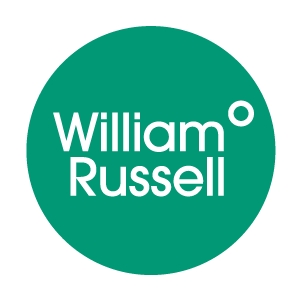QUICK SUMMARY- Colombian Healthcare For Expats
As an early retiree, saving on healthcare costs is one of the biggest reasons to move abroad. Medical insurance is an ugly political hand grenade in the United States. Yet, families in the US spend up to 15% of their annual incomes on healthcare costs. I read that medical insurance in Colombia is better and cheaper. Still, I had no idea how the system worked or if I was even eligible to enroll in Colombian health insurance.
To help out other US expats thinking of making the move to Colombia, I pulled together this guide to share my findings and help clear up the confusion and incorrect or outdated information found in expat groups.
For example, did you know that Colombian medical insurance is available to all citizens and legal residents of Colombia? Broadly speaking, three major forms of health insurance plans, but only two are open to expats. This article explains which two you may be eligible for and how to sign up.
I'll also show you how health insurance in Colombia works and what you can expect your medical coverage to cost per month.
Whether you are retiring to one of Medellin's hip expat neighborhoods or enjoying expat life in Colombia , read this guide to health insurance in Colombia and learn how to protect your new life in this fantastic country.
This post may contain affiliate links. I may get a commission if you purchase something using my link. Please note, there is NO ADDITIONAL COST to you. For more information, please see my disclosure.
6 Quick Tips To Prepare For A Move To Colombia
TIP 1. Understand Colombia's visa policy- A decade of experience living abroad taught me that a country's resident visa and permit situation can make or break a plan to move overseas. Chat with a Colombian visa attorney.
TIP 2. Know your health insurance requirements- Starting July 2022, the government requires all expats living in Colombia to purchase specific medical coverage that includes accidents, illness, hospitalization, disability, repatriation, maternity, and death.
TIP 3. Save On Moving Costs- International moves can get expensive. Save hundreds of dollars by getting accredited moving companies to compete for your business. Fill out a quick form, sit back and let our moving partners get you five free moving quotes from trusted and reliable international moving companies.
TIP 4. Set up a Traveling Mailbox- Change all your critical mailing addresses to a traveling mailbox. Don't lose an important tax return, bank statement, credit card, or government document in the mail. Sign up for a virtual mailbox, and you can keep a permanent US mailing address and check your mail via your phone or PC.
TIP 5. Prove your onward ticket- If you only have a tourist visa Colombia requires a mandatory departure ticket. You need a onward travel with a date leaving the country before your visa expires. Save money by using an onward plane ticket for just $16.
TIP 6. Pick up some Spanish Skills- The most common difficulty experienced by expats in Colombia is English being less common than expected. Only 4% of the country speaks English. You can get a free 7-day Spanish language crash course to make your move to Colombia easier.
Is the Colombian Healthcare system any good?
In a word, yes. The World Health Organization ranked Colombia as the 22nd most efficient healthcare system in the world. A more recent 2022 global ranking placed Colombia roughly equal to the American healthcare system when considering the skill, competency, speed, modern state-of-the-art equipment, waiting times, and costs.
Additionally, Colombia has 26 of the top-ranked Latin American hospitals. However, it should be noted that the most modern facilities and best-trained doctors are in Bogotá, Cali, and Medellín. The quality of health clinics in rural areas or smaller towns outside of Colombia's major cities may not be up to western health care standards.
Over 40% of the Best Hospitals In South America Are In Colombia
| Rank | Hospital | Score | City |
|---|---|---|---|
| 1 | Fundación Valle Del Lili | 97.20 | Cali |
| 2 | Fundación Santa Fe De Bogota | 96.27 | Bogotá |
| 3 | Hospital Pablo Tobón Uribe | 93.82 | Medellín |
| 4 | Fundación Hospitalaria San Vicente De Paul | 82.78 | Medellín |
| 5 | Hospital Universitario San Ignacio | 82.00 | Bogotá |
| 6 | Clínica Del Country | 81.65 | Bogotá |
| 7 | Clínica De Marly S.A | 76.25 | Bogotá |
| 8 | Administradora Clinica La Colina SAS | 76.15 | Bogotá |
| 9 | Centro Médico Imbanaco De Cali S.A. | 73.30 | Cali |
| 10 | Hospital General De Medellin Luz Castro De Gutierrez, E.S.E | 73.29 | Medellín |
| 11 | Clínica De Occidente | 72.53 | Cali |
| 12 | Empresa Social Del Estado Hospital Universitario De La Samaritana | 72.23 | Bogotá |
| 13 | Servicios Especiales De Salud Hospital Universitario De Caldas | 72.21 | Manizales |
| 14 | Clinica Medellin S.A | 72.21 | Medellín |
| 15 | Fundación Hospital San Vicente De Paul Rionegro | 71.49 | Rionegro |
| 16 | Clinica Los Nogales Sas | 70.00 | Bogotá |
| 17 | Clinica Del Prado S.A.S | 69.97 | Medellín |
| 18 | Clínica las Américas | 69.67 | Medellín |
| 19 | Organizacion Clinica General Del Norte | 69.47 | Barranquilla |
| 20 | E.S.E. Hospital Universitario Departamental De Nariño | 69.45 | Pasto |
| Source: The World's Best Hospitals Newsweek 2022 |
Read my other article to get 20+ tips on how expats can leverage healthcare in Colombia to save thousands on their medical bills.
Expat Insights On Colombian Health Insurance

Affordable Private Insurance Costs
My monthly payment here is less than my copayment for my policy I dropped in California that had a $5,000 deductible and covered surgeries, tests, exams, hospitals, at 80 percent.
Here [in Colombia] a copay is $8.50 to see a SURA private provider. Hospital copay for admittance is $12. Copay for blood lab tests, $3. All other Tests at 100 percent.
My lady and I both have had surgery here. Outstanding care. More personal than California. No hurry to get you out of the doctor’s office like the 10 minute appointments I so often had there.
B. Casper-US Citizen Living In Colombia
Low-Cost Insurance
SURA Classico [Private Insurance] for a 36 year old cost 3,899,344 COP / $810 USD. We just paid for one year.
On top of that we pay 272,000 COP / $57 USD a month for EPS [Public Insurance] including pension.
S. Bickerstaff- Expat In Colombia
Three Types Of Colombian Health Insurance (Tiered Healthcare System)
There are three types of medical insurance (EPS, Prepagada, and SISBEN) available in Colombia, though only two are available to expats.
- The first is the Entidades Promotoras de Salud (EPS)- EPS (translated to Health Promoting Entities) is Colombia's universal healthcare system, covering 96% of the population. Required by law, it is a form of mandatory public medical insurance for all Colombian citizens and foreign expats who are legal residents of the country. Your cost of insurance is solely based on your income.
- A second type of medical insurance, called "medicina prepagada,"- For wealthier Colombians and expats unsatisfied with the benefits of the public plan, Colombians and foreigners may pay extra for "medicina prepagada," or private health insurance that works on top of EPS plans. The additional cost of this insurance varies based on your age, the plan you choose, and any pre-existing conditions.
- SISBEN is a third form of insurance, but it isn't available to foreigners. SISBEN is intended for extremely vulnerable lower-income groups, providing homeless or poor Colombians with free or government subsidized medical care through their national health insurance system.
You can get a free cost quote for EPS and Medicina Prepagada from an accredited Colombian insurance specialist using the form below
Did You Know There Are 3 Types of Colombian Health Insurance Needed By Most Expats?
Starting in July 2022, specific medical coverage is required to legally stay in Colombia. Fill out the form to learn more from an insurance specialist. This is a FREE No-Obligation Service.
INSIDER TIP : Colombian Health Insurance May Not Be Required For Basic Care- If you have severe medical issues, you'll be well taken care of by Colombia's healthcare system, but in many cases, you wouldn't even need to go to a hospital or clinic to receive health care.
Unlike in the US, pharmacies don't simply dole out pills from a prescription from a doctor. Pharmacists in Colombia are medical professionals with additional training to provide a more direct role in diagnosing and relieving basic health symptoms.
Plus, most prescription drugs are available over-the-counter (OTC) in Colombia. The pharmacist can get you antibiotics or heavy-duty pain relievers directly without needing a separate trip to the doctor.
Overview Of Public Medical Insurance In Colombia
Who is eligible for public medical coverage in Colombia?
Colombia's 1993 constitutional reform made healthcare a fundamental right for every citizen and foreigner. Read that again—healthcare is a basic right, even for foreigners. As such, approximately 96% of Colombians have public medical coverage. Compared to the less than 28% of adults covered in the US in 2021, it's easy to see why the WHO ranks healthcare in Colombia better than in the United States.
One of the reasons the Colombian insurance number is over 400% higher than adults covered by public insurance in the US is that foreigners are eligible for EPS. All expats with a valid temporary visitor or permanent resident visa and a cedula must purchase mandatory public health insurance. However, foreigners holding only Colombian tourist visas are not eligible.
Foreigners who need to renew a visa are required to show proof of EPS coverage.
Did You Know Most Expats In Colombia Need 3 Types of Health Insurance?
Starting in July 2022, the government passed a law requiring specific medical coverage for foreigners staying in Colombia. Click the button below to ensure you are legally staying in Colombia.
Please note that eligibility requires a Colombian foreign ID card or Cédula de Extranjería. Your cedula has a unique number that ties to your electronic medical records. Only with a cedula can you register for medical insurance under the EPS. Read the INSIDER TIP below to find out more about this cédula.
INSIDER TIP : Colombian Cedula de Extranjeria- Any expat staying in Colombia for more than 3-months should sign up for a Cédula. While not mandatory, the Cedula is a foreigner identification card critical for expat life in Colombia. You will need a Cedula to obtain a bank account, sign a legal rental contract for an apartment, and access public health insurance in Colombia
Who pays for public health insurance in Colombia?
Colombia's public medical plan is funded by the Ministry of Health and managed by the Entidades Promotoras de Salud (Health Promoting Entity) EPS office. While the health care is administered by several local Colombian EPS insurance providers.
Remember that citizens and foreign residents are required by law to enroll under the public healthcare system through the EPS, which manages both the contributory and subsidized systems.
Your contribution to the EPS varies according to your financial status. Wealthier households (strata three to six) pay into the contributory system. In contrast, lower-income (strata one and two) families receive government-subsidized healthcare.
Salaried and self-employed citizens and residents in strata three to six contribute a percentage of their income to the General System of Social Security in Health (GSSSH) fund of the Ministry of Health. The employer also contributes to the fund in the case of a salaried employee.
INSIDER TIP : Employer Medical Insurance- Like the US, a local employer pays a portion of an expat's salary into an EPS health plan. However, your choice of plans is not forced. You, not the employer, still get to choose a Colombian insurer to administer your EPS plans.
The Entidades Promotoras de Salud (EPS) manages the program, sets the prices, and establishes the benefits and coverage levels. The health care services are then administered by local EPS insurance providers.
There are 32 EPS providers certified by the Ministry of Health. However, the most popular EPS health insurance company among expats is Suramericana, simply referred to as SURA.
List of the Top 10 EPS companies according to overall satisfaction
I was asked how I would rate my overall experience regarding the health care I have received. I cannot speak to all of the options, but the following are the top ten.
- Dusakawi (subsidized)
- Savia Salud (subsidized)
- Anaswayuu (subsidized)
- Surah (contributory)
- Coosalud (subsidized)
- Pijaos (subsidized)t
- Cauca Indigenous Association (subsidized)
- Mutual Ser (subsidized)
- Mesh (subsidized)
- New EPS (contributory)
INSIDER TIP :
Employer Medical Insurance- Colombian Health Insurance Providers- EPS is structurally very similar to the US PPO-style of medical insurance with one critical difference. Like a US PPO, each EPS provider has its own healthcare provider network with contracts with its own doctors and medical facilities. Once you choose an EPS provider, you need to use doctors from their approved network of providers or pay a higher out-of-network cost.
However, unlike in the United States, as a public healthcare plan, EPS sets your insurance premium rates based on income, not age or medical history. As such, each EPS company charges you the same price for basic coverage. When shopping for EPS health insurance in Colombia, you compare based on the quality of their network and customer service, not on cost.
What is the cost of Colombian Public Health Insurance (EPS)?
Most expats pay between $100 to $200 monthly for public health insurance in Colombia. But, EPS is a type of health insurance that charges based on your ability to pay, not your age or medical condition. In a nutshell, the amount you pay for EPS depends on your income calculation.
For an employee of a Colombian company, EPS is based on salary. If you are retired, it is based on pension or social security income. For self-employed freelancers and digital nomads, your payment is based on your contract value.
Expats Employed by Colombian companies pay 4% of Gross Monthly Income
The monthly premium for EPS health insurance is a total of 12.5% of the monthly gross income declared to the EPS. A portion comes from a salary deduction, and the other part comes from a company contribution.
Like the US, expats working for a Colombian company also have their employer pay 8.5% of their income for medical insurance. In addition to your employer's 8.5% contribution, your salary is deducted by 4% for your share of the EPS costs.
Assuming a gross monthly salary of 6,915,015 COP ($1500) per month, you would pay 276,601 COP or $60 USD for EPS insurance per month.

USD TO COP exchange rate as of this writing is 4,608 Pesos to US Dollar
Self-employed Expats (Digital Nomads, Freelancers) pay 5% of their Net Monthly Income
If you are freelancing or in the country as a digital nomad, you pay 5% of your Net Monthly Income. This amount is determined by the following simple formula: Monthly income - Monthly Business Expenses = Monthly Net Income.
Monthly Net Income x 40% (contribution base % paid into EPS) x 12.5% (EPS monthly rate) = Total EPS monthly cost
For example
- Calculate Net Monthly Income- If your monthly gross income is $1,500 USD and your monthly business expenses (office rent, supplies, etc.) are $500, then net income is $1,000 per month.
- Calculate the contribution base- The Ingreso Base Cotización (IBC) or contribution base is 40% of your net income. In this example, multiply $1,000 net income by 40% to get $400 USD
- Calculation of the EPS monthly cost- Freelancers must pay 12.5% of their IBC into EPS. The final calculation is $400 USD by 12.5% to get $50 USD- the amount you pay into the EPS contributory fund per month.
Let's break that down for a minute. If the expat cost of living in Colombia is roughly $1,000 per month. And you assume that net income = cost of living, then full coverage health insurance in Colombia costs you $50 per month!

Less than a cup of Starbucks coffee (or Juan Valdez coffee, since we are talking about Colombia) per day! Image Source
INSIDER TIP : A simplified version of the self-employed EPS calculator- Multiply net monthly income by 5%, because 40% x 12.5% = 5%. Using the same example above $1,000 x 5% = $50 per month USD.
Retired Expats pay 5% of Gross Monthly Income
If you are a retired expat, the amount you pay for EPS is based on total gross income. Depending on your tax residency, this amount can include all worldwide income, including from outside Colombia (for example, revenue from rental property, US social security, or pension income from your home country).
Gross monthly income is what you report to Colombia's version of the IRS, called the Colombian Tax and Customs National Authority (DIAN).
To arrive at your payment, use the following formula: Total Gross Monthly Income x 40% (contribution base % paid into EPS) x 12.5% (EPS monthly rate) = Total EPS monthly cost
For example, if your monthly gross income is $2,000 USD, multiply that by 40% to get $800 USD. Now multiply $800 USD by 12.5% to reach $100 USD. That is your total EPS monthly cost.
INSIDER TIP : Colombian Tax Residency- If you live in Colombia for more than 183 days within 365 days, you are considered a Colombian tax resident. Colombian tax residents are taxed on worldwide income, including income from the US. There is no current double taxation treaty with the United States.
Are expats required to pay for EPS health insurance in Colombia?
Yes, EPS health insurance is required for all legal residents in Colombia. When you renew a Colombian visa, you are required to buy EPS insurance and show proof of coverage from your EPS Health Provider Entity that the duration of the coverage is equal the maximum time of your visa.
How much do expats typically pay for EPS health insurance in Colombia?
EPS premiums depend on your financial situation, but expats usually pay around $100 USD monthly for EPS health insurance. This number assumes an income of roughly $2,000 USD per month. Keep in mind that the spouse and children of expats are covered by this same insurance without additional cost.
INSIDER TIP : EPS Complementary Plan (Plan Complementario)- As noted before, you might opt to pay more to add on benefits not offered by EPS. These additional packages are not technically private insurance but are just added on top of the standard EPS coverage. For example, they may include special dental treatments or types of physical therapy that are not covered by the standard EPS. Complementary plans also reduces your waiting time for appointments.
What are the pros and cons of the state health insurance system in Colombia?
All healthcare systems have pros and cons. Keep the following in mind as you determine whether the Colombian healthcare system meets your preferences and needs.
Advantages of EPS Insurance
Disadvantages of EPS Insurance
Overview of Medicina Prepagada Private Health Insurance In Colombia
We discussed in the previous section that foreigners on a valid visa must pay for EPS public health insurance, resulting in a huge patient population for the country. The consequence of universal healthcare is frequent long wait times and crowded hospital rooms. These factors are why many expats and wealthy Colombians supplement EPS with Medicina Prepagada or Private Health Insurance.
This insurance can be purchased from local Colombian insurance companies. But those who are not satisfied with the combination of the mandatory EPS with Medicina Prepagada may purchase an international private policy from a recommended expat medical insurance company.
How does Colombian private health insurance work?
The basic EPS health care policy is a foundation you can build. As noted, private insurance plans require you to have EPS as a base.
The "Medicina Prepagada" is an alternative high-end private health insurance system, but it charges premiums based on age and any pre-existing illness. Like a US health insurance plan, it enables payments or reimbursements for medical care received in Colombia.
Several local health insurance companies in Colombia offer private insurance plans to expats. With more access to private in-network doctors and hospitals than EPS, private insurance gives you a wide range of choices, shorter wait times, and direct access to specialists. With private insurance, your primary care doctor is not a gatekeeper; you can book appointments directly with specialists.

IMG Global Medical Plan
- Excellent for expats looking for an affordable global plan with the flexibility
- Your choice of plan options, geographic area, and deductibles
- Enjoy preventative care with no waiting period on wellness benefits
Most plans start at around $150 USD per month but can reach up to $500 USD or more for the premium plans. However, there are several ways to reduce your expat health insurance costs.
Unlike EPS, private insurance costs change based on age, gender, and medical history, and some insurance companies require a medical examination. Remember, these costs are on top of the mandatory contributions to EPS. In fact, before securing private health insurance, expats will be asked for proof of coverage in the public system.
INSIDER TIP :
Supplemental Private Health Insurance- Expats may choose to have both EPS and private medical insurance. For simple procedures, expats can use their assigned Instituciones Prestadoras de Servicios de Salud (IPS), which is the primary in-network health center designated by their EPS insurance provider.
However, when experiencing typical frustrations with the public Colombian healthcare system, including long wait times for appointments and overcrowded facilities, expats rely on their private health insurance coverage.
What are the advantages of paying the extra cost of private healthcare in Colombia?
As an analogy, think of EPS as an economy-class airplane seat (crowded, few amenities, waiting in lines), and consider a private policy as upgrading to first-class. Private health insurance focuses on offering efficient, timely, high-quality care with the freedom to choose your doctor or specialist.

Private hospitals are a first-class upgrade compared to the crowded and less modern public hospitals
Additionally, private insurance provides access to a prescreened network of health care providers, including more coverage of specialists and treatment options, to provide you with alternative ways to handle your medical needs.
Private plans save you time and hassle by allowing access to specialists without going through a primary care doctor. You simply call to make an appointment to see any specialist or schedule a diagnostic test. As an added bonus, private doctors and medical staff are often better trained and more likely to speak English.
Let's return to our metaphor in the beginning. Think of EPS as economy-class; imagine waiting weeks to set a doctor's appointment, then spending the day sitting in a crowded waiting room just to get a referral. Now consider first-class private health insurance, where appointments take days, not weeks, and can include a house call team of doctors that travel to your home for treatment, 24 hours per day, 365-days a year.

William Russell International Health Insurance Plan
- Perfect for expats who need customized care and don't visit the United States
- Get complete coverage for inpatient care including full cancer treatments
- Global coverage with a very strong network in SE Asia
Disadvantage Of Private Insurance In Colombia
Unlike public EPS insurance coverage, many Colombian private insurance companies have age restrictions and maximum age limits.
Most private insurers will start charging higher rates for older expats over 60 and stop coverage entirely after 62 years old.
Two private Colombian health insurance companies that insure older expats are:
- Sura's Plan 60 plus provides coverage until you reach 79
- Coomeva’s Tarifa Dorada Plan is one private medical insurance company that will continue to provide coverage until you are 100 years old
Domestic vs. International Private Medical Insurance
As an expat, you can choose domestic or international private health plans. Domestic plans offered by local Colombian companies provide medical treatment through their specific network of doctors. While global health insurance provides international cover and allows you to see any doctor you choose.
I recommend international health plans vs. local insurance for expats, but there are pros and cons to choosing each option.
Common Features Of Both Local And International Plans
Both local and international plans offer a wide variety of services compared to public insurance. Generally, both policies provide access to better equipped and less crowded private hospitals, more experienced doctors, and a better chance of getting a bilingual doctor. Both offer comprehensive coverage, including not only medical expenses for hospitalizations, but dental, vision, and maternity care, as well. Both types of insurance are usually more affordable for expats than health insurance in the US.
Advantages of Local Private Insurance
For expats on a budget, the main advantage of a domestic plan is the price. Local health insurance, also called domestic medical insurance, focuses on providing coverage solely in Colombia.
Local insurance costs are lower than a comparable international plan without any of the specialized expat benefits and global coverage of an international health plan.
List of local Colombian Health Insurers
- Sura
- Colmedic
- Colsanitas
- Medisanitas
- Medplus
- Coomeva
- Axa Colpatria
Advantages of international health insurance
The basic inpatient and outpatient medical benefits are very similar between local and international medical plans. However, international health insurance is designed with the unique needs of expats in mind. For example, international expat plans can offer the following:
- Getting help in English: It's no surprise that most insurance companies in Colombia use the Spanish language. One question you need to ask yourself—if you don't opt into international plans—is whether your Spanish is up to the task of dealing with common insurance problems: arguing claims with an insurance adjuster, understanding your policies contract, and even dealing with customer service.
- More comprehensive, international access to facilities: If Colombia doesn't offer the treatment you need, international expat insurance can locate quality care outside of Colombia. Even more, a global health insurance plan provides you access to hospitals in any country you travel to, which can be a lifesaver for expats who travel frequently.
- Translation services: International companies can offer translators to ensure clear communication between you and your doctor.
- Focus on personal comfort: Global expat insurance can provide private rooms in higher quality private facilities where you will get more attention from doctors and nursing staff.
- Emergency evacuation service: International companies provide health emergency transportation and repatriation services back to your home country for medical emergencies. Some international plans include non-medical evacuation services in the event of political unrest or natural disasters.
- Direct Billing: Many international health insurance providers can bill larger hospitals and family physicians directly, eliminating your financial burden of paying for medical bills in cash upfront and out-of-pocket.

Cigna Global Medical Insurance Plan
- Perfect for expats who need need comprehensive protection and 24/7 service.
- An international network with over 1.65 million trusted hospitals and doctors.
- All plans include mental health and cancer care.
Key Take Aways: Expat Medical Insurance In Colombia
Colombia has become a very popular destination for expats looking to escape the high cost of living in the United States and Europe. Especially for Americans with soaring potential health costs, the low prices of Colombian health insurance can literally be a life-saving option.
By several measures, Colombian healthcare is not only highly affordable but one of the best in the world. The healthcare system in Colombia is ranked #22 in the world, has highly skilled doctors and excellent hospitals modernized with the latest equipment. Many foreigners now head to the country for medical tourism, with corrective eye treatment, joint replacements, and plastic surgery topping the list of procedures.
Expats have a choice of three different Colombian health plans options:
- EPS Public Health Insurance Program ($)- Compulsory health insurance through the country's public EPS program for as little as $50 per month with vision and dental coverage and includes a spouse and children at no additional costs.
- Domestic Private Insurance Plan ($$)- For expats who want to avoid the hassle of dealing with overcrowded hospitals and want better-trained doctors, local private insurance may be purchased for an additional cost. Plans can start at around $100 per month.
- International Health Insurance Plan ($$$)- A premium insurance with all the benefits of a domestic plan but with additional advantages for expats. Expat health insurance includes worldwide coverage, medical evacuation or repatriation back to their home country, and translation services to ensure clear communication in English between you and your doctor. A 49-year-old male in good health can find plans starting at $145 per month.
While EPS is the cheapest option, many foreigners prefer international private insurance with tailored benefits for the unique needs of global citizens.
NEXT STEPS
If you liked this story, you will enjoy these other posts on expat insurance
Page [tcb_pagination_current_page] of [tcb_pagination_total_pages]
FAQs: Health Insurance For Expats In Colombia
To apply for public insurance, you must first acquire a valid Colombian visa. With a visa, you can obtain a cedula ID card from a Migración Colombia office. You can then apply for Colombian medical insurance through an EPS provider using your cedula.
Your coverage starts immediately after approval.
To purchase local private insurance, you simply need a passport and to contact a Colombian health insurer directly or apply through a local insurance broker.
To apply for international private insurance, you can click here to get free quotes from several different expat insurers. Additionally, you can read my article for a recommendation of the best international health insurers.
IMG is my recommended affordable expat insurance provider. Their Global Medical plans start at less than $100 for a 49-year-old male. This international plan can provide comprehensive coverage for expats while living in Colombia or anywhere they travel in the world.
Not only is IMG one of the cheapest international insurers, but they also have one of the highest customer service ratings.
My article on the best international health insurance providers provides more details on IMG and other recommended global insurers.
Depends if private or public insurance. Private plans usually have a maximum age limit of 60. Expats older than 60 will find their options reduced, and their rates increased. Sura, which can provide coverage until 79, and Coomeva's Tarifa Dorada Plan locking in coverage until 100, are the exceptions.
However, Colombia's public EPS plans cover all citizens and legal residents regardless of age. With a cedula and valid visa, expat retirees can purchase EPS medical insurance for 5% of their gross monthly income.





Hola Marco, thanks for this great article. I have a question:
You state expats need to show proof of EPS coverage to buy a medicina prepagada plan. However, I cannot get EPS coverage until I’m in Colombia and have a cédula. BUT to even apply for a (digital nomad) visa I need to present proof of health coverage.
This seems like a catch-22, unless I’m mistaken about first needing EPS coverage to apply for a private plan.
It seems like a catch-22, but it is not. To get a visa, you need proof of health care coverage, not EPS. To fulfill this requirement, you can purchase Travel Medical Insurance (available monthly) or International Health Insurance (requires yearly commit).
You may be asking why you would get yearly insurance instead of monthly because Travel Medical requires you to maintain some healthcare coverage in your home country. If that is not available to you, then an annual international plan is kinda your only option.
Once you have a residence visa, then you can apply for EPS. Once you have EPS, then you can apply for medicina propaganda.
Make sense? Cheers,
Marco
This is my hang-up.
All the insurance policies are not just health. They include travel, luggage, disruption, and the like. I pay for insurance in addition to my medical in the US and to pay additional amounts between $500-1000/month isn’t doable. I don’t even use doctors or medicine.
And then when I speak with lawyers or consultants I get conflicting information.
Hi Patricia, I feel your frustration. Spending hours researching the web for outdated answers or getting contradictory information from different sources is infuriating. When talking to agents/consultants, it’s essential they understand what stage in the process you are and what your insurance goals are.
For example, Colombia requires you to have one kind of insurance to apply for residency, and then requires a different insurance once you become a resident. That might be where you are getting conflicting information.
Another area where things get confusing is there is a difference between “Travel Insurance" and “Travel Health Insurance." None of the policies required to apply for a Colombian Visa or residency need luggage, disruption, etc.
I take it you are a US citizen? Do you plan on maintaining your US insurance? Are you trying to move to Colombia full time?